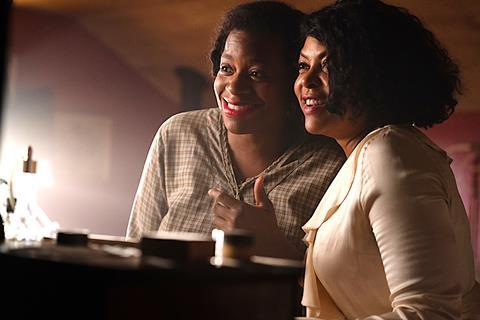Rousing adaptation of the Tony-winning musical of Alice Walker’s Pulitzer Prize-winning novel

Dir: Blitz Bazawule. US. 2023. 141mins
Pain and joy share the stage in The Color Purple, the largely successful adaptation of the hit Broadway musical of Alice Walker’s Pulitzer Prize-winning 1982 novel, previously turned into the Oscar-nominated 1985 drama directed by Steven Spielberg. This new picture heightens the story’s emotional impact, aspiring to be a show-stopping spectacle that goes for the throat.
Expect glowing word of mouth over the holidays
Director Blitz Bazawule, who previously made the Beyonce visual album Black Is King, is certainly on firm footing during The Color Purple’s propulsive song-and-dance numbers. Yet a strong cast helps bring needed nuance to a tale of a Black woman (Fantasia Barrino) in the first half of the 20th century, who is trying to find her way in an America beset with racism and abusive men.
Opening on Christmas Day in the US, with a January 26 release planned for the UK, this Warner Bros. picture could be a major player both commercially and with voters. The 1985 film received 11 Oscar nods, including Best Picture, and the musical earned 11 Tony nominations in 2006, winning for Best Actress. (A revival mounted about a decade later won Tony’s for Best Revival and Best Actress.) The crowd-pleasing, tear-jerking new film is produced by Hollywood heavyweights Oprah Winfrey (who was Oscar-nominated for her role in the 1985 film) and Spielberg, and features a starry cast that includes Taraji P. Henson and Colman Domingo — not to mention Danielle Brooks and Fantasia Barrino, who were part of the Broadway revival. Expect glowing word of mouth over the holidays.
Starting in the early 1900s and stretching out into the late 1940s, the film introduces us to Celie (Barrino, reprising her onstage role for her feature debut), a Georgia woman who has been sexually abused by her father, giving birth to two children as a teenager. (Phylicia Pearl Mpasi plays Celie in her younger years.) Married off to a cruel-hearted local farmer, Mister Johnson (Domingo), and separated from her children and her loving baby sister Nettie (Halle Bailey), Celie feels trapped in her husband’s home — until she meets the strong-willed women Sofia (Brooks, reprising her onstage role), who is married to Johnson’s son (Corey Hawkins), and Shug (Henson), an unbridled singer who Johnson has always lusted after.
The Color Purple’s songs, written by Brenda Russell, Allee Willis and Stephen Bray, are a feast of blues, gospel and ragtime, a constant highlight of this two-hour-plus film. Bazawule’s staging can occasionally veer toward a flashy music-video aesthetic but, on the whole, these sequences ripple with energy, and tunes like ‘Hell No!’ and ‘Push Da Button’ are impressive showcases for the forceful ensemble. Frequently, the songs express the pent-up anguish and desire felt by the female characters who, to various degrees, are stagnating in a patriarchal, racist society that holds them down. As a result, the musical performances are acutely poignant, Celie and her friends singing what they cannot say.
Because the film understandably emphasises its musical set pieces, the dramatic connective tissue is not always as strong. Bazawule, for example, does not seem nearly so confident guiding performances as he is handling dynamic movements, expertly choreographed by Fatima Robinson. Even so, Domingo’s Mister Johnson is an utterly frightening figure, a brutal man whose physical and mental abuse of Celie is grippingly loathsome. Barrino embodies her character’s arduous path to independence, while Henson clearly relishes playing a bombastic blues singer who has learned to survive in a man’s world.
This Color Purple does restore some of Walker’s original narrative, including one romantic subplot that Spielberg’s version soft-pedalled. But newcomers need not be conversant in the previous iterations in order to be engrossed. Bazawule has crafted an accessible, polished entertainment, accented by Paul Denham Austerberry’s lived-in production design, that focuses on what has made this narrative so resonant for decades — although those familiar with the 1985 film will appreciate seeing one of its stars providing a brief cameo
Still, there is a fascinating tension within the musical, which casts a harsh light on Black life in America not long after the abolishment of slavery, examining characters grappling with poverty, bigotry and lack of education — as well as rape and spousal neglect. At the same time, though, Bazawule’s film wants to be inviting enough to attract a sizable mainstream audience, shying away from a bleaker portrait in order to deliver a paean to the importance of reconciliation, forgiveness and faith.
That balance of despair and hope, dark reality and a feel-good ending is not always perfectly executed but, as the picture navigates its plot twists and reaches its moving finale, the tonal discrepancies begin to feel insignificant. Ultimately, The Color Purple is a very sad story buttressed by resilient female characters who arrive in a better place because they create a nurturing community together. Celie has experienced so much heartbreak — who could begrudge her the salvation she so richly deserves?
Production companies: Amblin Entertainment, OW Films, SGS Pictures, QJP Productions
Worldwide distribution: Warner Bros.
Producers: Steven Spielberg, Oprah Winfrey, Scott Sanders, Quincy Jones
Screenplay: Marcus Gardley, based on the novel by Alice Walker and based on the musical stage play, book (of the musical stage play) by Marsha Norman, music and lyrics by Brenda Russell, Allee Willis and Stephen Bray
Cinematography: Dan Laustsen
Production design: Paul Denham Austerberry
Editing: Jon Poll
Music: Kris Bowers
Main cast: Taraji P. Henson, Danielle Brooks, Colman Domingo, Corey Hawkins, Gabriella Wilson “H.E.R.,” Halle Bailey, Louis Gossett Jr., Aunjanue Ellis-Taylor, Fantasia Barrino, Phylicia Pearl Mpasi, Ciara, Jon Batiste















![[L-R]: Amanda Villavieja, Laia Casanovas, Yasmina Praderas](https://d1nslcd7m2225b.cloudfront.net/Pictures/274x183/6/4/1/1471641_pxl_20251224_103354743_618426_crop.jpg)








